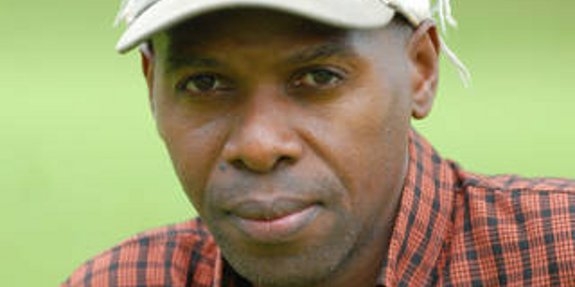Timothy Kalyegira (45) is a researcher, columnist and regular suspect of the Ugandan state. He was arrested and detained twice, for ‘sedition’ and ‘criminal libel’, as a result of opinion pieces he wrote in his blog Uganda Online. His columns for the respectable Daily Monitor newspaper have also landed him in hot water.
It has been said that African conflicts should be resolved through the African Union and regional African states. Foreign powers should stay away from conflict on the continent. But you criticize Kenya for trying to fight terrorism in Somalia.
The presence of the Kenyan Defence Force in Somalia, for the past two years, has only brought more terror and violence to the region. There are terror attacks very regularly nowadays.
Does this mean that Kenya is very bad at fighting terrorism?
It is also that the conflict isn’t local. The terrorists and their followers aren’t attacking local institutions, they are attacking targets associated with the West. When there is an attack, the FBI and the Israelis become involved. Kenya is the foremost US base in the region. It operates as a US proxy. Al Qaeda has been reported to be involved, so it’s bigger than local on both sides.
So perhaps the Americans should come to the region’s rescue for real? Surely people who massacre and torture innocent civilians need to be hit hard?
What any government should know by now is that you must attack terrorism by separating the terrorists from their popular support base. Win hearts and minds of Muslims in Somalia and Kenya. Local African solutions could be found in familiarity and understanding of local sentiment. But that is not what is happening.
Are you saying that local people in East Africa support the terrorists?
Many young men joined the terrorist Al Shabaab after the violent overthrow of the Somali government by Ethiopia and the US in 2001. It’s like what happened in Iraq when the US went to war to overthrow Saddam Hussein. Saddam was bad, but the solution turned out to be worse than the problem.
Surely such strategies of talking to locals, winning hearts and minds, so to speak, have been tried?
In Kenya, refugee communities, ordinary Muslims and peaceful political opponents have been victimised by police and army goons. After the 2010 bomb attacks in Uganda, human rights activists were detained, including myself.
Are the US supportive of such repression-only strategies? One would expect President Obama to know better than that?
After 9/11, the US has just been in warpath-mode. Maybe Obama wants to follow a different strategy, but he may not be able to push that. Remember he didn’t even manage to close Guantanamo Bay.
So because of oppression of opponents and Muslin communities, more and more peace-loving citizens will side with terrorists?
The abuse of average citizens, especially the Muslim part of the population, has the effect that many ordinary people will now not cooperate in the fight against terrorism. They will feel aggression towards the government, just like their young male cousins in Al Shabaab. They may not agree with violent tactics, but the majority are in line with Al Shabaab’s traditional Islamic values. They believe that these are an answer to the corruption, exploitation and abuse they experience.
What kind of traditional Islamic values?
On women’s rights and gay rights, for example. Many traditional people really don’t agree with Western views on those issues.
As if there aren’t any feminists and gays within the Muslim communities of Somalia and Kenya?
There are. And they need support. But what is often overlooked is that oppression of the communities as a whole has the effect of hardening traditional attitudes. Many equate Western military invasion, government corruption, oppression and lawlessness with youngsters having premarital sex and other lifestyles that are seen as immoral. The West is seen to be at the root of all that immorality.
Aren’t these just the views of very old, very orthodox people?
In Nairobi and Kampala, even westernised youngsters listen to reggae music with radical anti-Western lyrics, about imperialist agendas and Syria and so on.
Isn’t calling all Westerners ‘immoral’ or ‘imperialist’ the same as calling all Muslims ‘terrorists’?
It would help if there was less arrogance. Westerners should recognise that their lectures on human rights are often perceived to be hypocritical. The West has supported plenty oppressive governments, like Mobutu and Charles Taylor. It does deals with corrupt governments to get oil.
Sure, Westerners must be self-critical too. But people with modern human rights values can’t stand by when people are persecuted for gender or sexual orientation?
One should stand in solidarity with those who are persecuted. But solutions must not be worse than the problem. The issue that many people in the Islamic world have a problem with is selective justice, selective intervention and selective morality.
This interview was conducted by Evelyn Groenink, ZAM Chronicle’s investigations editor.


